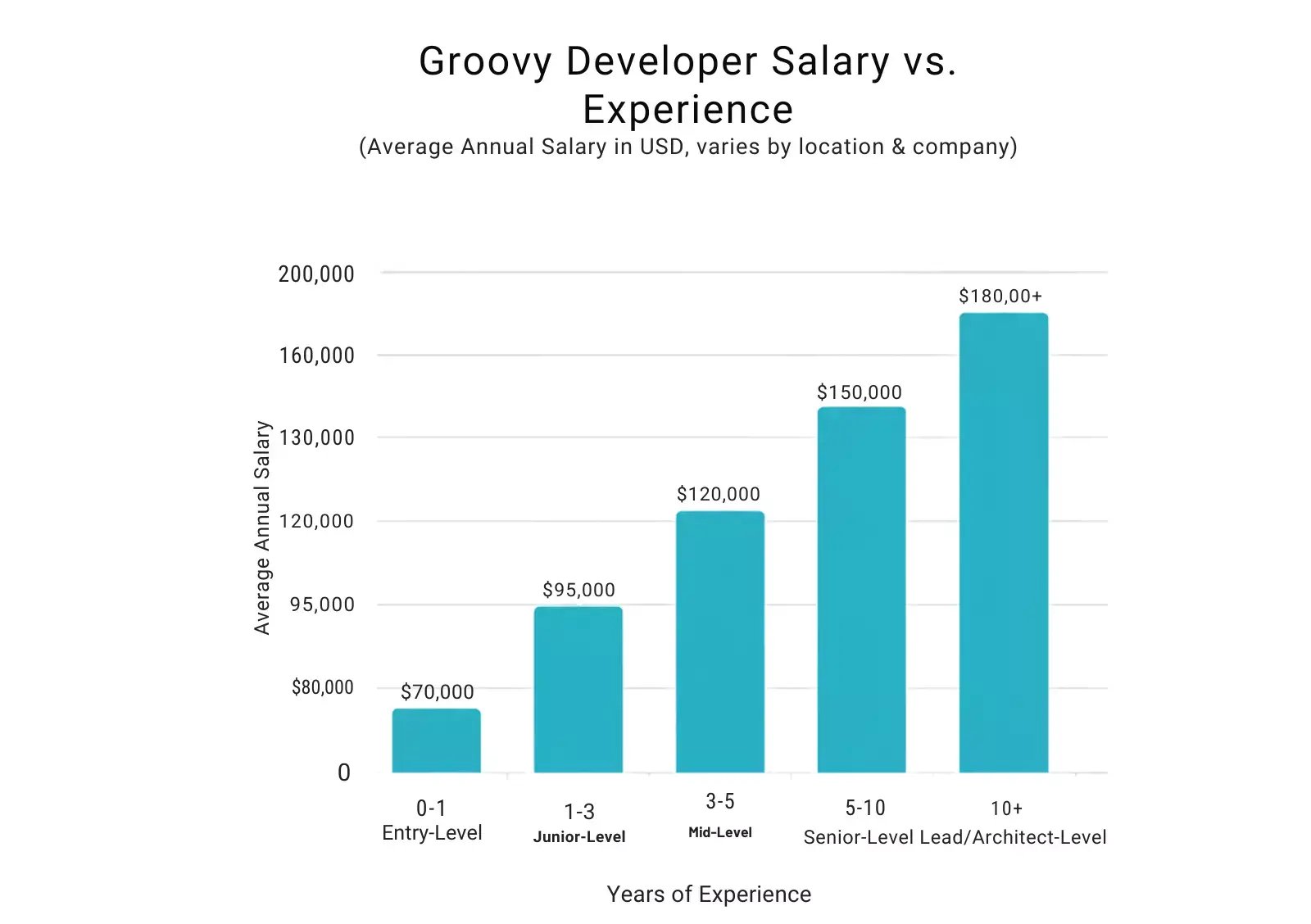The Absolute Beginner's Guide to Groovy Programming
Are you curious about the world of programming but feeling overwhelmed by the sheer number of languages out there? Do you want to learn a powerful yet approachable language that can open doors to exciting career opportunities? Then you've come to the right place! This comprehensive guide will introduce you to Groovy programming, a versatile language that's perfect for beginners and seasoned developers alike.
What is Groovy Programming?
Groovy is an object-oriented programming language for the Java platform. It's often described as a "dynamic language for the Java Virtual Machine (JVM)" because it can seamlessly integrate with existing Java code and libraries, while offering a more concise and expressive syntax. Think of it as a super-powered version of Java, designed for speed and flexibility.
Groovy boasts features like:
- Dynamic and Static Typing: You can choose to write code with or without explicit type declarations, offering flexibility.
- Concise Syntax: It requires less boilerplate code compared to Java, making development faster.
- Scripting Capabilities: Groovy can be used as a scripting language, making it ideal for automation, testing, and building domain-specific languages (DSLs).
- Functional Programming Support: It includes features that make functional programming paradigms easy to implement.
- Seamless Java Integration: You can use any Java library directly in your Groovy code, and vice-versa.
Why Groovy Training?
Investing in Groovy training offers several compelling advantages:
- Productivity Boost: Groovy's concise syntax and powerful features allow developers to write less code and accomplish more, leading to faster development cycles.
- Leverage Existing Java Knowledge: If you already know Java, Groovy is incredibly easy to pick up, as it builds upon the same foundation.
- Versatility: From web development (Grails framework) to build automation (Gradle) and testing (Spock), Groovy has a wide range of applications.
- High Demand in Specific Niches: Companies using technologies like Gradle, Grails, and Jenkins often specifically seek Groovy expertise.
- Enhanced Skillset: Adding Groovy to your resume makes you a more well-rounded and attractive candidate, especially in environments that utilize the JVM.
Who Can Do Groovy Training?
Groovy training is suitable for a diverse audience:
- Absolute Beginners: Its simplified syntax and dynamic nature make it a great first language.
- Java Developers: For those already familiar with Java, Groovy is a natural next step to enhance productivity and explore new paradigms.
- Scripting Enthusiasts: If you love automation and scripting, Groovy's capabilities are a perfect fit.
- QA Engineers/Testers: Groovy, especially with frameworks like Spock, is excellent for writing robust and readable tests.
- DevOps Engineers: Groovy is heavily used in build automation tools like Gradle and CI/CD pipelines with Jenkins.
- Students and Graduates: Learning Groovy can give you an edge in the job market, especially for roles involving JVM technologies.
Course Outcome
Upon completing a comprehensive Groovy programming course, you can expect to:
- Understand Groovy's syntax, core features, and object-oriented principles.
- Be proficient in writing Groovy scripts for various automation tasks.
- Be able to integrate Groovy with existing Java applications.
- Gain knowledge of popular Groovy frameworks like Grails for web development and Spock for testing.
- Develop robust applications and test suites using Groovy.
- Be prepared to tackle real-world programming challenges and contribute to Groovy-based projects.
Career Opportunities for Groovy Programming
Groovy skills open doors to several exciting career paths:
- Software Developer/Engineer: Building applications using Groovy, often within a Java ecosystem.
- Backend Developer: Working with frameworks like Grails to create robust web service backends.
- Automation Engineer: Developing scripts for various automation tasks, including system administration and data processing.
- QA Engineer/Test Automation Engineer: Designing and implementing automated tests using Groovy and frameworks like Spock.
- DevOps Engineer: Configuring and extending build tools like Gradle and CI/CD pipelines with Groovy.
- Java Developer with Groovy Expertise: Many Java roles prefer or require candidates who can also work with Groovy for scripting or testing.
Salary Package with Graphical Representation - Experience Vs Package in $
The salary for Groovy professionals can vary significantly based on experience, location, company size, and specific skill set (e.g., expertise in Grails, Gradle, Spock). However, generally, Groovy developers command competitive salaries, especially given its niche yet critical role in many enterprises.
Here's an illustrative graph showing how salary packages might grow with experience for a Groovy developer (figures are approximate and can vary widely):
Groovy Developer Salary vs. Experience (Illustrative)

These figures are averages and can be higher in tech hubs or for roles with specialized skills.
Companies Hiring Groovy Programming Professionals
Many companies, particularly those in the enterprise sector and those leveraging the JVM, actively seek Groovy talent. These often include:
- Large Enterprises: Companies with extensive Java infrastructure often use Groovy for scripting, testing, and build automation.
- Tech Companies: Especially those building internal tools, CI/CD pipelines, or microservices on the JVM.
- Financial Institutions: For robust and reliable backend systems.
- E-commerce Companies: Building scalable web applications.
- Software Consultancies: Providing solutions to clients using Groovy and related technologies.
- Startups: Utilizing Groovy's productivity for rapid development.
Specific examples of companies that have used or continue to use Groovy in various capacities include Netflix (for internal tools), LinkedIn, and many others heavily invested in the JVM ecosystem.
Roles and Responsibilities
A Groovy programming professional might undertake various roles and responsibilities, depending on their specific job title:
-
Software Developer:
-
Design, develop, and maintain applications using Groovy and related frameworks (e.g., Grails).
-
Write clean, efficient, and well-documented code.
-
Collaborate with teams to define, design, and ship new features.
-
Debug and resolve technical issues.
-
-
Test Automation Engineer:
-
Develop and execute automated test scripts using Groovy and testing frameworks (e.g., Spock).
-
Integrate automated tests into CI/CD pipelines.
-
Report and track defects.
-
Contribute to improving testing processes and methodologies.
-
-
DevOps Engineer:
-
Automate build, test, and deployment processes using Groovy in tools like Gradle and Jenkins.
-
Manage and maintain CI/CD pipelines.
-
Write scripts for infrastructure provisioning and monitoring.
-
Optimize development workflows.
-
Steps to Prepare for Groovy Programming Certification
While a formal Groovy certification isn't as widely established as for Java, demonstrating your skills is key. Here's a path to becoming proficient and preparing for potential validation:
1. Master the Fundamentals:
- Start with Groovy's basic syntax, data types, operators, and control structures.
- Understand object-oriented concepts in Groovy (classes, objects, inheritance, polymorphism).
- Familiarize yourself with Groovy's dynamic features, closures, and metaprogramming.
2. Explore Key Features:
- Dive into Groovy's collection enhancements.
- Learn about Groovy Builders (e.g., MarkupBuilder, JsonBuilder).
- Understand file I/O and working with external resources.
- Practice exception handling.
3. Work with Frameworks/Tools:
- Grails: If interested in web development, learn the Grails framework.
- Spock: Essential for testing, master the Spock testing framework.
- Gradle: Understand how Groovy is used for build scripts in Gradle.
4. Hands-on Projects:
- Build small projects to apply your knowledge. Create a simple web application with Grails, automate a task with a Groovy script, or write a comprehensive test suite for a small Java application using Spock.
5. Read Official Documentation and Books:
-
The official Groovy documentation is an excellent resource.
-
Read books specifically on Groovy programming to deepen your understanding.
6. Join the Community:
-
Participate in online forums, Stack Overflow, and Groovy user groups.
- Contribute to open-source Groovy projects.
7. Consider a Comprehensive Course:
- Enroll in a structured online or in-person Groovy training program to get guided learning.
8. Practice Regularly:
- Consistent coding practice is crucial for solidifying your skills.
Conclusion
Groovy programming offers a fantastic blend of power, flexibility, and ease of use. Whether you're a complete beginner looking for an approachable entry into programming or an experienced developer aiming to boost your productivity on the JVM, Groovy has something to offer. Its growing presence in enterprise environments, particularly in build automation, testing, and web development, makes it a valuable skill to acquire.
By investing in Groovy training and continuously practicing, you can unlock exciting career opportunities and become a highly sought-after professional in the dynamic world of software development. Start your Groovy journey today and discover the endless possibilities!
You May Also Like
These Related Stories

Beginner’s Roadmap to Generative AI for Finance Leaders

Learn Java Microservices from Scratch: Beginner’s Complete Guide


No Comments Yet
Let us know what you think